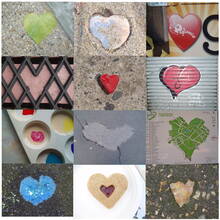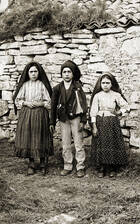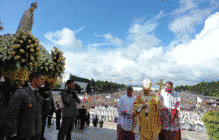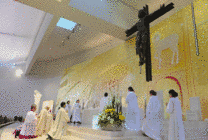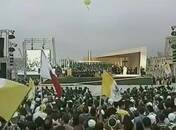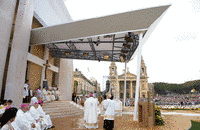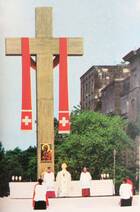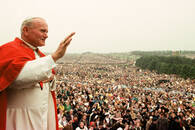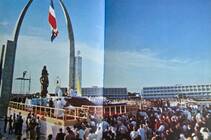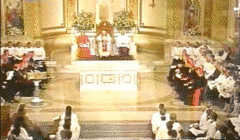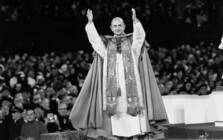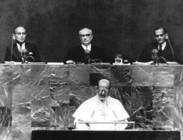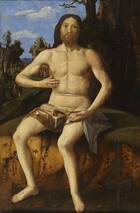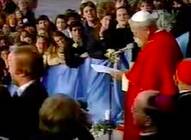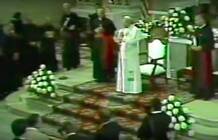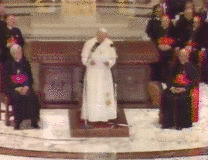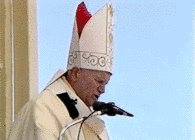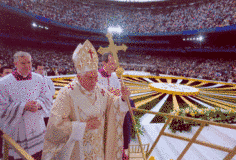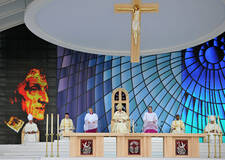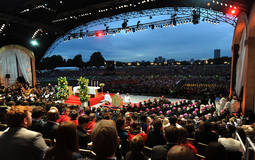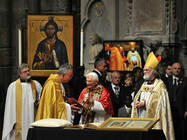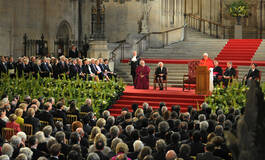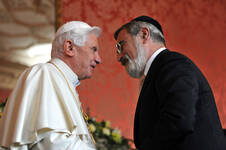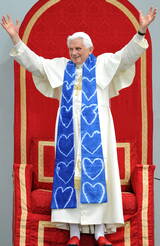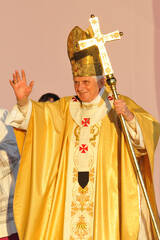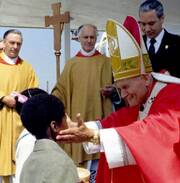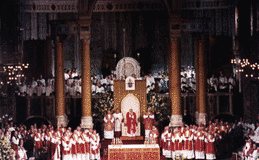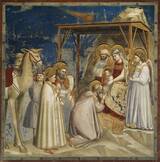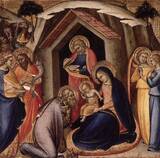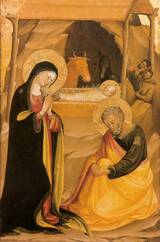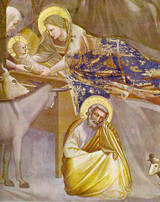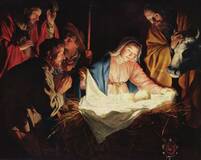Papa's Words
The beautiful words of our Holy Fathers - Papas St Paul VI, St John Paul II, Benedict XVI & Francis - shining light on what is good and true.
Many of our Papas' words in encyclicals & apostolic exhortations are included on Totus2us Novenas (split into 9 bits, as they're chunky!):
Francis on the Light of Faith
BXVI on Christian Hope & God is Love
JPII on the Redeemer of Man, the Holy Spirit, Our Lady, St Joseph, the Church of the Eucharist, Faith & Reason, the Gospel of Life, Europe & the salvific meaning of suffering.
Plus JPII's words on the Sacred Heart of Jesus & BXVI's words at JPII's funeral & beatification.
For catechesis (given at the Wednesday audiences), check out Catechesis with Papas Francis, BXVI & JPII.
Click on the titles for the whole text of the recordings (& links to other languages on Vatican website). You can subscribe to this Totus2us podcast on Spotify, here on iTunes or here on the RSS feed.
To download the free mp3 Totus2us audio recordings individually, right/double click on the light blue play buttons.
Papa JPII na Beatificação de Francisco e Jacinta 
Santuário de Nossa Senhora do Rosário de Fátima, 13 de Maio de 2000
"A minha última palavra é para as crianças: Queridos meninos e meninas, vejo muitos de vós vestidos como Francisco e Jacinta. Fica-vos muito bem! Mas, logo ou amanhã, já deixais essa roupa e... acabam-se os pastorinhos. Não haviam de acabar, pois não?! É que Nossa Senhora precisa muito de vós todos, para consolar Jesus, triste com as asneiras que se fazem; precisa das vossas orações e sacrifícios pelos pecadores.
Pedi aos vossos pais e educadores que vos metam na «escola» de Nossa Senhora, para que Ela vos ensine a ser como os pastorinhos, que procuravam fazer tudo o que lhes pedia. Digo-vos que «se avança mais em pouco tempo de submissão e dependência de Maria, que durante anos inteiros de iniciativas pessoais, apoiados apenas em si mesmos» (S. Luís de Montfort). Foi assim que os pastorinhos se tornaram santos depressa. Uma mulher que acolhera a Jacinta em Lisboa, ao ouvir conselhos tão bons e acertados que a pequenita dava, perguntou quem lhos ensinava. «Foi Nossa Senhora» ― respondeu. Entregando-se com total generosidade à direcção de tão boa Mestra, Jacinta e Francisco subiram em pouco tempo aos cumes da perfeição."
Homilia do Papa Bento XVI em Fátima 
Esplanada do Santuário de Fátima, Quinta-feira 13 de Maio de 2010
"Queridos peregrinos, «A linhagem do povo de Deus será conhecida […] como linhagem que o Senhor abençoou» (Is 61, 9). Assim começava a primeira leitura desta Eucaristia, cujas palavras encontram uma realização admirável nesta devota assembleia aos pés de Nossa Senhora de Fátima. Irmãs e irmãos muito amados, também eu vim como peregrino a Fátima, a esta «casa» que Maria escolheu para nos falar nos tempos modernos. Vim a Fátima para rejubilar com a presença de Maria e sua materna protecção. Vim a Fátima, porque hoje converge para aqui a Igreja peregrina, querida pelo seu Filho como instrumento de evangelização e sacramento de salvação. Vim a Fátima para rezar, com Maria e tantos peregrinos, pela nossa humanidade acabrunhada por misérias e sofrimentos. Enfim, com os mesmos sentimentos dos Beatos Francisco e Jacinta e da Serva de Deus Lúcia, vim a Fátima para confiar a Nossa Senhora a confissão íntima de que «amo», de que a Igreja, de que os sacerdotes «amam» Jesus e n’Ele desejam manter fixos os olhos ao terminar este Ano Sacerdotal, e para confiar à protecção materna de Maria os sacerdotes, os consagrados e consagradas, os missionários e todos os obreiros do bem que tornam acolhedora e benfazeja a Casa de Deus."
Papa Bento XVI em Vespers em Fátima 
Igreja da SS.ma Trindade, Fátima, Quarta-feira 12 de Maio de 2010
"Permiti abrir-vos o coração para vos dizer que a principal preocupação de todo o cristão, nomeadamente da pessoa consagrada e do ministro do Altar, há-de ser a fidelidade, a lealdade à própria vocação, como discípulo que quer seguir o Senhor. A fidelidade no tempo é o nome do amor; de um amor coerente, verdadeiro e profundo a Cristo Sacerdote. «Se o Baptismo é um verdadeiro ingresso na santidade de Deus através da inserção em Cristo e da habitação do seu Espírito, seria um contra-senso contentar-se com uma vida medíocre, pautada por uma ética minimalista e uma religiosidade superficial» (JPII, Novo millennio ineunte, 31). Neste Ano Sacerdotal, já a caminho do fim, uma graça abundante desça sobre todos vós para viverdes a alegria da consagração e testemunhardes a fidelidade sacerdotal alicerçada na fidelidade de Cristo. Isto supõe, evidentemente, uma verdadeira intimidade com Cristo na oração, pois será a experiência forte e intensa do amor do Senhor que há-de levar os sacerdotes e os consagrados a corresponderem ao seu amor de modo exclusivo e esponsal."
Papa BXVI to the Young People in Malta 
"God loves every one of us with a depth and intensity that we can hardly begin to imagine. And he knows us intimately, he knows all our strengths and all our faults. Because he loves us so much, he wants to purify us of our faults and build up our virtues so that we can have life in abundance. When he challenges us because something in our lives is displeasing to him, he is not rejecting us, but he is asking us to change and become more perfect. That is what he asked of St Paul on the road to Damascus. God rejects no one. And the Church rejects no one. Yet in his great love, God challenges all of us to change and to become more perfect.
St John tells us that perfect love casts out fear (cf 1 Jn 4, 18). And so I say to all of you, “Do not be afraid!” How many times we hear those words in the Scriptures! They are addressed by the angel to Mary at the Annunciation, by Jesus to Peter when calling him to be a disciple, and by the angel to Paul on the eve of his shipwreck. To all of you who wish to follow Christ, as married couples, as parents, as priests, as religious, as lay faithful bringing the message of the Gospel to the world, I say, do not be afraid! You may well encounter opposition to the Gospel message. Today’s culture, like every culture, promotes ideas and values that are sometimes at variance with those lived and preached by our Lord Jesus Christ. Often they are presented with great persuasive power, reinforced by the media and by social pressure from groups hostile to the Christian faith. It is easy, when we are young and impressionable, to be swayed by our peers to accept ideas and values that we know are not what the Lord truly wants for us. That is why I say to you: do not be afraid, but rejoice in his love for you; trust him, answer his call to discipleship, and find nourishment and spiritual healing in the Sacraments of the Church.
Here in Malta, you live in a society that is steeped in Christian faith and values. You should be proud that your country both defends the unborn and promotes stable family life by saying no to abortion and divorce. I urge you to maintain this courageous witness to the sanctity of life and the centrality of marriage and family life for a healthy society. In Malta and Gozo, families know how to value and care for their elderly and infirm members, and they welcome children as gifts from God. Other nations can learn from your Christian example. In the context of European society, Gospel values are once again becoming counter-cultural, just as they were at the time of St Paul."
Papa BXVI's homily at Mass in Malta 
Floriana Granaries, Third Sunday of Easter, 18th April 2010
"More than any of the cargo we might carry with us – in terms of our human accomplishments, our possessions, our technology – it is our relationship with the Lord that provides the key to our happiness and our human fulfilment. And he calls us to a relationship of love. Notice the question that he put three times to Peter on the shore of the lake: “Simon, son of John, do you love me?” On the basis of Peter’s affirmative response, Jesus assigns him a task – the task of feeding his flock. Here we see the basis of all pastoral ministry in the Church. It is our love for the Lord that must inform every aspect of our preaching and teaching, our celebration of the Sacraments, and our care for the people of God. It is our love for the Lord that moves us to love those whom he loves, and to accept gladly the task of communicating his love to those we serve. During our Lord’s Passion, Peter denied him three times. Now, after the Resurrection, Jesus invites him three times to avow his love, in this way offering him healing and forgiveness and at the same time entrusting him with his mission. The miraculous catch of fish underlined the apostles’ dependence on God for the success of their earthly projects. The dialogue between Peter and Jesus underlined the need for divine mercy in order to heal their spiritual wounds, the wounds of sin. In every area of our lives we need the help of God’s grace. With him, we can do all things: without him we can do nothing."
Papa St JPII's homily at Mass in Warsaw 
Poland, Vigil of Pentecost, 2 June 1979
„3a. Kościół przyniósł Polsce Chrystusa — to znaczy klucz do rozumienia tej wielkiej i podstawowej rzeczywistości, jaką jest człowiek. Człowieka bowiem nie można do końca zrozumieć bez Chrystusa. A raczej: człowiek nie może siebie sam do końca zrozumieć bez Chrystusa. Nie może zrozumieć, ani kim jest, ani jaka jest jego właściwa godność, ani jakie jest jego powołanie i ostateczne przeznaczenie. Nie może tego wszystkiego zrozumieć bez Chrystusa.
I dlatego Chrystusa nie można wyłączać z dziejów człowieka w jakimkolwiek miejscu ziemi. Nie można też bez Chrystusa zrozumieć dziejów Polski — przede wszystkim jako dziejów ludzi, którzy przeszli i przechodzą przez tę ziemię. Dzieje ludzi! Dzieje narodu są przede wszystkim dziejami ludzi. A dzieje każdego człowieka toczą się w Jezusie Chrystusie. W Nim stają się dziejami zbawienia.
Dzieje narodu zasługują na właściwą ocenę wedle tego, co wniósł on w rozwój człowieka i człowieczeństwa, w jego świadomość, serce, sumienie. To jest najgłębszy nurt kultury. To jej najmocniejszy zrąb. To jej rdzeń i siła. Otóż tego, co naród polski wniósł w rozwój człowieka i człowieczeństwa, co w ten rozwój również dzisiaj wnosi, nie sposób zrozumieć i ocenić bez Chrystusa. „Ten stary dąb tak urósł, a wiatr go żaden nie obalił, bo korzeń jego jest Chrystus” (Piotr Skarga, Kazania sejmowe).
Trzeba iść po śladach tego, czym — a raczej kim — na przestrzeni pokoleń był Chrystus dla synów i córek tej ziemi. I to nie tylko dla tych, którzy jawnie weń wierzyli, którzy Go wyznawali wiarą Kościoła. Ale także i dla tych, pozornie stojących opodal, poza Kościołem. Dla tych wątpiących, dla tych sprzeciwiających się."
Papa St JPII's homily at Mass in Drogheda 
Ireland, 29 September 1979
"I join my voice today to the voice of Paul VI and my other predecessors, to the voices of your religious leaders, to the voices of all men and women of reason, and I proclaim, with the conviction of my faith in Christ and with an awareness of my mission, that violence is evil, that violence is unacceptable as a solution to problems, that violence is unworthy of man. Violence is a lie, for it goes against the truth of our faith, the truth of our humanity. Violence destroys what it claims to defend: the dignity, the life, the freedom of human beings. Violence is a crime against humanity, for it destroys the very fabric of society. I pray with you that the moral sense and Christian conviction of Irish men and women may never become obscured and blunted by the lie of violence, that nobody may ever call murder by any other name than murder, that the spiral of violence may never be given the distinction of unavoidable logic or necessary retaliation. Let us remember that the word remains for ever: "All who take the sword will perish by the sword".
10. There is another word that must be part of the vocabulary of of every Christian, especially when barriers of hate and mistrust have been constructed. This word is reconciliation. "So if you are offering your gift at the altar, and there remember that your brother has something against you, leave your gift there before the altar and go; be reconciled with your brother, and then come and offer your gift" (Mt 5, 23-24). This command of Jesus is stronger than any barrier that human inadequacy or malice can build. Even when our belief in the fundamental goodness of every human being has been shaken or undermined, even if long-held convictions and attitudes have hardened our hearts, there is one source of power that is stronger than every disappointment, bitterness or ingrained mistrust, and that power is Jesus Christ, who brought forgiveness and reconciliation to the world.
I appeal to all who listen to me ; to all who are discouraged after the many years of strife, violence and alienation — that they attempt the seemingly impossible to put an end to the intolerable. I pay homage to the many efforts that have been made by countless men and women in Northern Ireland to walk the path of reconciliation and peace. The courage, the patience, the indomitable hope of the men and women of peace have lighted up the darkness of these years of trial. The spirit of Christian forgiveness shown by so many who have suffered in their persons or through their loved ones have given inspiration to multitudes. In the years to come, when the words of hatred and the deeds of violence are forgotten, it is the words of love and the acts of peace and forgiveness which will be remembered. It is these which will inspire the generations to come.
To all of you who are listening I say: do not believe in violence; do not support violence. It is not the Christian way. It is not the way of the Catholic Church. Believe in peace and forgiveness and love; for they are of Christ.
Communities who stand together in their acceptance of Jesus' supreme message of love, expressed in peace and reconciliation, and in their rejection of all violence, constitute an irresistible force for achieving what many have come to accept as impossible and destined to remain so."
Papa JPII a los Seminaristas Mexicanos 
Seminario de Guadalajara, Mexico, 30 de enero de 1979
"Dios que es verdad y es amor se nos ha manifestado en la historia de la creación y en la historia de la salvación: una historia incompleta aún, la de la humanidad, que “aguarda impaciente a que se revele lo que es ser hijos de Dios”. El mismo Dios nos ha escogido, nos ha llamado para infundir nueva fuerza en esa historia, ahora ya sabiendo que la salvación “es don de Dios, no viene de las obras, y que somos hechura suya, creados en Cristo Jesús” (Ef 1, 8-10). Una historia que es en los designios de Dios, también la nuestra, porque nos quiere obreros en su viña, nos quiere embajadores suyos para salir al encuentro de todos e invitarlos a entrar en su banquete, nos quiere samaritanos, que usan misericordia con el prójimo desvalido.
Ya esto bastaría para vislumbrar de cerca cuán grande es la vocación. Experimentarla es un acontecimiento único, indecible que únicamente se percibe, como un soplo suave a través del toque desvelante de la gracia: un soplo del Espíritu que, al mismo tiempo que da perfil auténtico a nuestra frágil realidad humana – vaso de arcilla en manos del alfarero –, enciende en nuestros corazones una luz nueva, infunde una fuerza extraordinaria que, cimentándonos en el amor, incorpora nuestra existencia al quehacer divino, a su plan de re-creación de hombre en Cristo, es decir, la formación de su nueva familia redimida. Estáis pues llamados a construir la Iglesia – comunión con Dios –, algo muy por encima de lo que uno puede pedir o imaginar."
Papa San Juan Pablo II a los Habitantes del Barrio 'Los Minas' 
República Dominicana, Viernes 26 de enero de 1979
"Y he querido venir aquí precisamente porque se trata de una zona pobre, para que tuvierais la oportunidad – diría por título más alto – de estar con el Papa. El ve en vosotros una presencia más viva del Señor, que sufre en los hermanos más necesitados, que sigue proclamando bienaventurados a los pobres de espíritu, a quienes padecen por la justicia y son puros de corazón, trabajan por la paz, son compasivos y mantienen la esperanza en el Cristo Salvador.
Pero al invitaros a cultivar esos valores espirituales y evangélicos, deseo haceros pensar en vuestra dignidad de hombres y de hijos de Dios. Quiero alentaros a ser ricos en humanidad, en amor a la familia, en solidaridad con los demás. A la vez, os animo a desarrollar cada vez más las posibilidades que tenéis de lograr una mayor dignificación humana y cristiana."
Papa St JPII's homily at Mass in New York 
Central Park, New York, Feast of Our Lady of the Rosary 1995
"I invite you to reflect on what makes each one of you truly marvellous and unique. Only a human being like you can think and speak and share your thoughts in different languages with other human beings all over the world, and through that language express the beauty of art and poetry and music and literature and the theatre, and so many other uniquely human accomplishments.
And most important of all, only God’s precious human beings are capable of loving. Love makes us seek what is good; love makes us better persons. It is love that prompts men and women to marry and form a family, to have children. It is love that prompts others to embrace the religious life or become priests. Love makes you reach out to others in need, whoever they are, wherever they are. Every genuine human love is a reflection of the Love that is God himself, to the point where the First Letter of St John says: "The man without love has known nothing of God; for God is love" (1 Jn 4, 8). .."
Papa St JPII's homily at St Joseph's Seminary 
Yonkers, Friday 6 October 1995
""If there is one challenge facing the Church and her priests today, it is the challenge of transmitting the Christian message whole and entire, without letting it be emptied of its substance. The Gospel cannot be reduced to mere human wisdom. Salvation lies not in clever human words or schemes, but in the Cross and Resurrection of our Lord Jesus Christ. The wisdom of the Cross is at the heart of the life and ministry of every priest. ...
Do not be afraid, I say, because great courage is required if we are to open the doors to Christ, if we are to let Christ enter into our hearts so fully that we can say with St Paul, "The life I live now is not my own; Christ is living in me" (Gal 2, 20), Conquering fear is the first and indispensable step for the priest if he is to open the doors, first of his own heart, then of the hearts of the people he serves, to Christ the Redeemer. You need courage to follow Christ, especially when you recognize that so much of our dominant culture is a culture of flight from God, a culture which displays a not–so–hidden contempt for human life, beginning with the lives of the unborn, and extending to contempt for the frail and the elderly. Some people say that the Pope speaks too much about the "culture of death". But these are times in which – as I wrote in my encyclical Evangelium Vitae – "choices once unanimously considered criminal and rejected by the common moral sense are gradually becoming socially acceptable" (EV, 4). The Church cannot ignore what is happening.
5. And yet, this is only one part of the picture. The complete picture is what I wrote at the beginning of the same encyclical: "The Gospel of Life is at the heart of Jesus’ message. Lovingly received day after day by the Church, it is to be preached with dauntless fidelity as ‘good news’ to the people of every age and culture" (EV, 1). Therefore, dear Seminarians, you must not be afraid to confront the "wisdom of this world" with the certainty of the teachings of Christ in which you are grounded, but above all with the love of Christ, with the compassion and the mercy of Christ, who – like the Father – desires everyone to be saved and to come to the knowledge of the truth (cf 1 Tim 2, 4). The disciple cannot be greater than the master (cf Mt 10, 24). You will not become priests to be served, or to lord it over others (cf Mt 20, 28), but to serve others, especially the poorest of the poor, the materially poor and the spiritually poor.
Open the doors of your hearts in order that Christ may enter and bring you his joy. The Church needs joyful priests, capable of bringing true joy to God’s people, which is the Good News in all its truth and transforming power."
Papa Paul VI's homily at Mass in NY 
Yankee Stadium, New York, Feast of St Francis Assisi, 4th October 1965, during his apostolic pilgrimage to the USA
"Truly, verily, Peace be to you!
How rich in meaning, how abundant in good things, is this divine and human greeting of Peace! Repeated thousands of times, we all recognize it, we all desire it. And that is good. But allow Us to exhort you to consider it once again, to preserve it as the Gospel message of the Pope as He lands on this soil and proclaims to all those He meets: Peace be to this house, to this continent, and to all those who inhabit it!
We have, then, three things to say to you.
First of all, you must love peace. Here We can use the words of Christ: «Blessed are the peacemakers, for they shall be called the son of God» (Matth. 5, 9). If we truly wish to be Christians, we must love peace, we must make our own the cause of peace, we must meditate on the real meaning of peace, we must conform our minds to the thought of peace. In the past, it was not always so in the education of minds and the training of citizens; but today it must be so; we must love peace, because its dwelling is first in men’s hearts, and only afterwards in the external condition of society. Peace must live and reign in men’s consciences, as Holy Scripture teaches us: «May the peace of Christ reign in your hearts» (Col. 3, 15). Peace is order, in relation to God and in relation to men; it is wisdom, it is justice, it is civilization. Whoever loves peace loves mankind, without distinction of race or of colour.
Second thought: You must serve the cause of peace. Serve it, and not make use of it for aims other than the true aims of peace. Serve it, and not use this noble standard as a cover for cowardice or selfishness, which refuses to make sacrifices for the common good; not debilitate and pervert the spirit, by evading the call of duty and seeking one’s own interests and pleasure. Peace is not a state which can be acquired and made permanent. Peace must be built; it must be built up every day by works of peace. These works of peace are, first of all, social order; then, aid to the poor, who still make up an immense multitude of the world population, aid to the needy, the weak, the sick, the ignorant. Peace must be like a garden, in which public and private beneficence cultivates the choicest flowers of friendship, of solidarity, of charity and love.
Third thought: Peace must be based on moral and religious principles, which will make it sincere and stable. Politics do not suffice to sustain a durable peace. The absence of conflict does not suffice to make of peace a source of happiness and of true human progress. Peace must have its roots anchored in wisdom, and this wisdom must draw nourishment from the true concept of life, that is the Christian concept. Remember the words of the Lord Jesus: «Peace I leave with you, My peace I give to you. Not as the world gives do I give to you» (Io. 14, 27). Jesus, the Prince of Peace (Is. 9, 6), has His own original and characteristic peace, which can regulate every human relationship because, in the very first place, it regulates the relationship with God.
Coming among you at a moment, so beautiful, so brief but so important, as this, We have no better greeting, no better remembrance for you than to repeat that holy salutation of Christ: Peace, His peace!"
Papa Paul VI's address to United Nations 
"Et ici Notre Message atteint son sommet. Négativement d'abord: c'est la parole que vous attendez de Nous et que Nous ne pouvons prononcer sans être conscient de sa gravité et de sa solennité: jamais plus les uns contre les autres, jamais, plus jamais! N'est-ce pas surtout dans ce but qu'est née l'Organisation des Nations-Unies: contre la guerre et pour la paix? Ecoutez les paroles lucides d'un grand disparu, John Kennedy, qui proclamait, il y a quatre ans: "L'humanité devra mettre fin à la guerre, ou c'est la guerre qui mettra fin à l'humanité." Il n'est pas besoin de longs discours pour proclamer la finalité suprême de cette Institution. Il suffit de rappeler que le sang de millions d'hommes, que des souffrances inouïes et innombrables, que d'inutiles massacres et d'épouvantables ruines sanctionnent le pacte qui vous unit, en un serment qui doit changer l'histoire future du monde: jamais plus la guerre, jamais plus la guerre! C'est la paix, la paix, qui doit guider le destin des peuples et de toute l'humanité!
.... En un mot, l'édifice de la civilisation moderne doit se construire sur des principes spirituels, les seuls capables non seulement de le soutenir, mais aussi de l'éclairer et de l'animer. Et ces indispensables principes de sagesse supérieure ne peuvent reposer – c'est Notre conviction, vous le savez – que sur la foi en Dieu. Le Dieu inconnu dont parlait Saint Paul aux Athéniens sur l'aréopage? Inconnu de ceux, qui pourtant, sans s'en douter, le cherchaient et l'avaient près d'eux, comme il arrive à tant d'hommes de notre siècle? . . . Pour nous, en tout cas, et pour tous ceux qui accueillent l'ineffable révélation que le Christ nous a faite de lui, c'est le Dieu vivant, le Père de tous les hommes."
Papa Francis's Homily at the Easter Vigil 
Holy Saturday 31 March 2018
"And if yesterday, with the women, we contemplated “the one whom they have pierced” (cf Jn 19, 36; cf Zech 12, 10), today with them we are called to contemplate the empty tomb and to listen to the words of the angel: “Do not be afraid… He is risen” (Mt 28, 5-6). Words that want to reach our deepest convictions and certainties, our ways of judging and dealing with everyday events; especially our way of relating with others. The empty tomb wants to challenge, move, question us, but above all it wants to encourage us to believe and trust that God “happens” in any situation, in any person, and that his light can reach into the most unpredictable and closed corners of existence. He has risen from death, he has risen from the place from which nobody awaits anything and He awaits us – as He awaited the women – so as to render us participants in his work of salvation. This is the foundation and the strength that we have as Christians so as to spend our lives and our energy, intelligence, affections and will in seeking and especially in generating pathways of dignity. He is not here… He is risen! It is the announcement that sustains our hope and transforms it into concrete gestures of love. How much we need to let our fragility be anointed by this experience! How much we need our faith to be renewed, our myopic horizons to be challenged and renewed by this announcement! He is risen and with Him rises our creative hope to face actual problems, because we know that we are not alone.
To celebrate Easter means to believe anew that God bursts into and does not cease to burst into our stories, defying our uniform and paralyzing determinisms. To celebrate Easter means to let Jesus conquer that pusillanimous attitude that so often besieges us and tries to bury every kind of hope.
The stone of the sepulchre has done its part, the women have done their part, now the invitation is addressed once again to you and to me: the invitation to break from repetitive habits, to renew our lives, our choices and our existence. An invitation that is addressed to us here where we find ourselves, in that which we are doing and are being; with the “quota of power” that we have. Do we want to participate in this announcement of life or will we remain silent before events?
He is not here… he is risen! And he is waiting for you in Galilee, he is inviting you to return/go back to the time and place of the first love, so as to say to you: Do not be afraid, follow me."
Papa Francis's Message for Lent 2018 
Given on 1 November 2017, Feast of All Saints
.. Dante Alighieri, in his description of hell, imagines the devil seated on a throne of ice [Inferno XXXIV, 28-29]; he dwells in the coldness of suffocated love. Let us ask ourselves then: how does charity turn cold in us. What are the signs that warn us that love risks being extinguished in us?That which extinguishes charity is above all the greed for money, “the root of all evil” (1 Tim 6, 10); it is followed by the rejection of God and thus the rejection of finding consolation in Him, preferring our desolation to the comfort of his Word and of the Sacraments [1]. All this transmutes into violence that turns against those who are considered a threat to our own “certainties”: the child not yet born, the sick elderly person, the passing guest, the stranger, but also the neighbour who does not correspond to our expectations.
Creation also becomes a silent witness to this cooling of charity: the earth is poisoned by waste thrown away out of carelessness or for self-interest; the seas, also polluted, must sadly engulf the remains of numerous shipwrecked victims of forced migration; the heavens - which in the design of God sing his glory - are furrowed by machines that rain down instruments of death.
Love also grows cold in our communities: in the apostolic exhortation Evangelii Gaudium I sought to describe the most evident signs of this lack of love. They are: selfish sloth, sterile pessimism, the temptation to isolate oneself and to engage in endless fratricidal wars, the worldly mentality which induces one to deal only with that which is apparent, in such a way reducing missionary ardour [Evangelii Gaudium, 76-109]. ...
Papa St JPII's Message for Lent 1979 
You ask: “What has become of Lent?” You think that the relatively small renunciation of food does not mean much when so many of our brothers and sisters, victims of wars and catastrophes, suffer so much, physically and morally.
Fasting concerns personal asceticism, which is always necessary, but the Church asks the baptized to characterize this liturgical time also in another way. Indeed, Lent has for us a precise meaning: it must manifest to the eyes of the world that the entire People of God, as sinners, is preparing itself in Penance to re-live liturgically the Passion, Death and Resurrection of Christ. This public and collective witness has its own source in the spirit of Penance of each one of us and it also leads us to deepen interiorly this behaviour and better motivate it.
To renounce does not mean only to give that which is superfluous, but sometimes also that which is necessary, like the widow in the Gospel who knew that her very mite was already a gift received from God. To renounce means to free oneself from the slavery of a civilization that pushes us more and more to comfort and consumption, without any concern even for the preservation of our environment, the common heritage of humanity. ...
Papa Paul VI's Message for Lent 1978 
We remain truly impressed by the description, given to us in the Acts of the Apostles, about community life in the primitive Church: “All the believers stood together and held everything in common” (Acts 2, 44). This was not about an artificial invention, devised so as to cement the cohesion of the young community in Jerusalem; rather it was the expression of “a single heart” (Acts 4, 46), which inspired all the gestures of the believers, unifying them in the very heart of Jesus.
One of the most notable effects of this unanimity is indicated to us in the "Acts", which states that a constant sharing of goods was carried out according to each one's needs. Hence the first Christians spontaneously practised the principle according to which the goods of this world are destined by the Creator as satisfaction for the necessities of everyone, without exception. Christian sharing translates into facts this natural obligation, made infinitely more cogent under the impulse of charity.
Sharing is thus a fundamental Christian attitude. In the numerous initiatives of love for ones's neighbour, from almsgiving and individual service to collective contributions for the promotion of peoples materially disadvantaged, the Christian experiences the joy of sharing, of enjoying in common a heritage, which God has generously put at the disposition of everyone.
It has been said that there is an art in giving and an art in receiving; but Christians have only one term for both these acts: that of fraternal sharing. May the present Lent make us really practice this as a sign of communion with all men, who are all called to participate in the Mystery of the Cross and of the Resurrection of Christ! ...
Papa St JPII's words to students 
Catholic University, Washington DC, Sunday 7th October 1979, during his 1st apostolic pilgrimage to the USA
"One thing you have told me already: by choosing to welcome me with the offering of your prayers, you have demonstrated that you understand what is most important in your lives — your contact with God, your searching for the meaning of life by listening to Christ as he speaks to you in the Scriptures. I am pleased to know that reflection on spiritual and religious values is part of your desire to live fully this time of your lives. Materialistic concerns and one-sided values are never sufficient to fill the heart and mind of a human person. A life reduced to the sole dimension of possessions, of consumer goods, of temporal concerns will never let you discover and enjoy the full richness of your humanity. It is only in God — in Jesus, God made man — that you will fully understand what you are. He will unveil to you the true greatness of yourselves: that you are redeemed by him and taken up in his love; that you are made truly free in him who said about himself: "If the son frees you, you will be free indeed" (Jn 8, 36).
I know that you, like students all over the world, are troubled by the problems that weigh on society around you and on the whole world. Look at those problems, explore them, study them and accept them as a challenge. But do it in the light of Christ. He is "the way, and the truth, and the life" (Jn 14, 6). He put all human life in the true dimension of truth and of authentic love. True knowledge and true freedom are in Jesus. Make Jesus always part of your hunger for truth and justice, and part of your dedication to the well-being of your fellow human beings."
Papa St John Paul II's address to Seminarians 
St Charles Seminary, Philadelphia, Wednesday 3 October 1979
"I want to remind you of the importance of fidelity. Before you can be ordained, you are called by Christ to make a free and irrevocable commitment to be faithful to him and to his Church. Human dignity requires that you maintain this commitment, that you keep your promise to Christ no matter what difficulties you may encounter, and no matter what temptations you may be exposed to. The seriousness of this irrevocable commitment places a special obligation upon the rector and faculty of the seminary — and in a particular way on the spiritual director — to help you to evaluate your own suitability for ordination. It is then the responsibility of the bishop to judge whether you should be called to the priesthood.
It is important that one's commitment be made with full awareness and personal freedom. And so during these years in the seminary, take time to reflect on the serious obligations and the difficulties which are part of the priest's life. Consider whether Christ is calling you to the celibate life. You can make a responsible decision for celibacy only after you have reached the firm conviction that Christ is indeed offering you this gift, which is intended for the good of the Church and for the service of others (cf Letter to Priests, 9).
To understand what it means to be faithful we must look to Christ, the "faithful witness" (Rev 1, 5), the Son who "learned to obey through what he suffered" (Heb 5, 8); to Jesus who said: "My aim is to do not my own will, but the will of him who sent me" (Jn 5, 30). We look to Jesus, not only to see and contemplate his fidelity to the Father despite all opposition (cf Heb 23, 3), but also to learn from him the means he employed in order to be faithful: especially prayer and abandonment to God's will (cf Lk 22, 39).
Remember that, in the final analysis, perseverance in fidelity is a proof not of human strength and courage but of the efficacy of Christ's grace. And so if we are going to persevere we shall have to be men of prayer who, through the Eucharist, the liturgy of the hours and our personal encounters with Christ, find the courage and grace to be faithful. Let us be confident then, remembering the words of St Paul: "There is nothing that I cannot master with the help of the one who gives me strength" (Phil 4, 13)."
Papa JPII's address in Miami on Prayer 
Cathedral of Saint Mary, Thursday 10th September 1987, during his 4th apostolic pilgrimage to the USA
"The 'Our Father' teaches us that our relationship to God is one of dependence. We are his adopted sons and daughters through Christ. All that we are and all that we have comes from him and is destined to return to him. The 'Our Father' also presents prayer to us as an expression of our desires. Beset as we are by human weakness, we naturally ask God for many things. Many times we may be tempted to think that He does not hear or answer us. But as St Augustine wisely reminds us, God already knows what we desire even before we ask. He says that prayer is for our benefit, because in praying we "exercise" our desires so that we will grasp what God is preparing to give us. It is an opportunity for us to "widen our hearts".
In other words, God is always listening to us and answering us – but from the perspective of a love far greater and a knowledge far deeper than our own. When it appears that He is not fulfilling our desires by granting the things we ask, however unselfish and noble they may be, in reality He is purifying those desires of ours for the sake of a higher good that often surpasses our understanding in this life. The challenge is to "widen our hearts" by hallowing His name, by seeking His Kingdom, and by accepting His will. Like Christ in the Garden of Gethsemane we may sometimes pray either for ourselves or others, "Father, you have the power to do all things. Take this cup away!" But also like Christ we must add, "Not my will but your will be done".
The act of praying is also meant to open us up to God and our neighbour, not only in words but also in action. That is why Christian spirituality, following Jesus himself, associates prayer with fasting and almsgiving. A life of self-denial and charity is a sign of conversion to God’s way of thinking, to his way of love. By humbling ourselves through penance, we open ourselves to God. By giving in charity, over and above the demands of justice, we open ourselves to our neighbour. St Peter Chrysologus gives witness to this tradition when he says: "Prayer, fasting and mercy .. give life to one another. What prayer knocks for upon a door, fasting successfully begs and mercy receives. For fasting is the soul of prayer; and mercy is the life of fasting... Fasting does not germinate unless watered by mercy".."
Papa St JPII's homily at Mass in Melbourne 
Flemington Racecourse, 28th November 1986, during his 1st apostolic pilgrimage to Australia
"Will the Christian community defend the gift of life from conception to the moment of death? It is not the quality of life - however important this may be - which makes life sacred, but the very fact of our existence. Life is a gift of God. Man is merely its administrator within the limits of the Creator’s design. If the vulnerable and defenceless are not safe, no one is safe for long. No human rights are safe in a world without firm moral principles, in a world where everything is relative and depends merely on a particular opinion or point of view. God has given us our reason and his revealed teaching, in order to help us recognize these truths and defend fundamental values. If we explain them badly or ignore their consequences in public life, we will have betrayed our Christian heritage.
My visit is meant to be an invitation to the ecclesial community in Australia and especially to the laity to take a firm stand on the side of life and love, truth and justice, and the dignity of every human being. Ultimately I am asking you to take a stand for God! What I am saying is this: "Know that he, the Lord, is God. He made us, we belong to him." This is the great task of the priestly People of God."
Papa Benedict XVI's homily at Mass in Yankee Stadium 
The Bronx, New York, 5th Sunday of Easter, 20th April 2008
"Yesterday, not far from here, I was moved by the joy, the hope and the generous love of Christ which I saw on the faces of the many young people assembled in Dunwoodie. They are the Church’s future, and they deserve all the prayer and support that you can give them. And so I wish to close by adding a special word of encouragement to them. My dear young friends, like the seven men, “filled with the Spirit and wisdom” whom the Apostles charged with care for the young Church, may you step forward and take up the responsibility which your faith in Christ sets before you! May you find the courage to proclaim Christ, “the same, yesterday, and today and for ever” and the unchanging truths which have their foundation in him (cf Gaudium et Spes, 10; Heb 13:8). These are the truths that set us free! They are the truths which alone can guarantee respect for the inalienable dignity and rights of each man, woman and child in our world – including the most defenseless of all human beings, the unborn child in the mother’s womb. In a world where, as Pope John Paul II, speaking in this very place, reminded us, Lazarus continues to stand at our door, let your faith and love bear rich fruit in outreach to the poor, the needy and those without a voice. Young men and women of America, I urge you: open your hearts to the Lord’s call to follow him in the priesthood and the religious life. Can there be any greater mark of love than this: to follow in the footsteps of Christ, who was willing to lay down his life for his friends (cf Jn 15, 13)?"
Papa Benedict XVI's homily at Mass with Cardinal Newman's beatification 
Cofton Park Birmingham, Sunday 19th September
"Cardinal Newman’s motto, Cor ad cor loquitur, or 'Heart speaks unto heart', gives us an insight into his understanding of the Christian life as a call to holiness, experienced as the profound desire of the human heart to enter into intimate communion with the Heart of God. He reminds us that faithfulness to prayer gradually transforms us into the divine likeness. As he wrote in one of his many fine sermons, “a habit of prayer, the practice of turning to God and the unseen world in every season, in every place, in every emergency – prayer, I say, has what may be called a natural effect in spiritualizing and elevating the soul. A man is no longer what he was before; gradually he has imbibed a new set of ideas, and become imbued with fresh principles”. Today’s Gospel tells us that no one can be the servant of two masters, and Blessed John Henry’s teaching on prayer explains how the faithful Christian is definitively taken into the service of the one true Master, who alone has a claim to our unconditional devotion. Newman helps us to understand what this means for our daily lives: he tells us that our divine Master has assigned a specific task to each one of us, a “definite service”, committed uniquely to every single person: “I have my mission”, he wrote, “I am a link in a chain, a bond of connexion between persons. He has not created me for naught. I shall do good, I shall do his work; I shall be an angel of peace, a preacher of truth in my own place … if I do but keep his commandments and serve him in my calling.”"
Papa BXVI at the Prayer Vigil 
Hyde Park, London, Saturday 18 September 2010
"One of the Cardinal’s best-loved meditations includes the words, “God has created me to do him some definite service. He has committed some work to me which he has not committed to another” (Meditations on Christian Doctrine). Here we see Newman’s fine Christian realism, the point at which faith and life inevitably intersect. Faith is meant to bear fruit in the transformation of our world through the power of the Holy Spirit at work in the lives and activity of believers. No one who looks realistically at our world today could think that Christians can afford to go on with business as usual, ignoring the profound crisis of faith which has overtaken our society, or simply trusting that the patrimony of values handed down by the Christian centuries will continue to inspire and shape the future of our society. We know that in times of crisis and upheaval God has raised up great saints and prophets for the renewal of the Church and Christian society; we trust in his providence and we pray for his continued guidance. But each of us, in accordance with his or her state of life, is called to work for the advancement of God’s Kingdom by imbuing temporal life with the values of the Gospel. Each of us has a mission, each of us is called to change the world, to work for a culture of life, a culture forged by love and respect for the dignity of each human person. As our Lord tells us in the Gospel we have just heard, our light must shine in the sight of all, so that, seeing our good works, they may give praise to our heavenly Father (cf Mt 5, 16).
Here I wish to say a special word to the many young people present. Dear young friends: only Jesus knows what “definite service” he has in mind for you. Be open to his voice resounding in the depths of your heart: even now his heart is speaking to your heart. Christ has need of families to remind the world of the dignity of human love and the beauty of family life. He needs men and women who devote their lives to the noble task of education, tending the young and forming them in the ways of the Gospel. He needs those who will consecrate their lives to the pursuit of perfect charity, following him in chastity, poverty and obedience, and serving him in the least of our brothers and sisters. He needs the powerful love of contemplative religious, who sustain the Church’s witness and activity through their constant prayer. And he needs priests, good and holy priests, men who are willing to lay down their lives for their sheep. Ask our Lord what he has in mind for you! Ask him for the generosity to say “yes!” Do not be afraid to give yourself totally to Jesus. He will give you the grace you need to fulfil your vocation."
BXVI's words in Westminster Abbey 
"Gathered in this ancient monastic church, we can recall the example of a great Englishman and churchman whom we honour in common: Saint Bede the Venerable. At the dawn of a new age in the life of society and of the Church, Bede understood both the importance of fidelity to the word of God as transmitted by the apostolic tradition, and the need for creative openness to new developments and to the demands of a sound implantation of the Gospel in contemporary language and culture.
This nation, and the Europe which Bede and his contemporaries helped to build, once again stands at the threshold of a new age. May Saint Bede’s example inspire the Christians of these lands to rediscover their shared legacy, to strengthen what they have in common, and to continue their efforts to grow in friendship. May the Risen Lord strengthen our efforts to mend the ruptures of the past and to meet the challenges of the present with hope in the future which, in his providence, he holds out to us and to our world. Amen."
Papa Benedict XVI's Address in Westminster Hall 
Houses of Parliament, London - Friday 17 September 2010
during his pilgrimage to the United Kingdom
"The central question at issue, then, is this: where is the ethical foundation for political choices to be found? The Catholic tradition maintains that the objective norms governing right action are accessible to reason, prescinding from the content of revelation. According to this understanding, the role of religion in political debate is not so much to supply these norms, as if they could not be known by non-believers – still less to propose concrete political solutions, which would lie altogether outside the competence of religion – but rather to help purify and shed light upon the application of reason to the discovery of objective moral principles. This “corrective” role of religion vis-à-vis reason is not always welcomed, though, partly because distorted forms of religion, such as sectarianism and fundamentalism, can be seen to create serious social problems themselves. And in their turn, these distortions of religion arise when insufficient attention is given to the purifying and structuring role of reason within religion. It is a two-way process. Without the corrective supplied by religion, though, reason too can fall prey to distortions, as when it is manipulated by ideology, or applied in a partial way that fails to take full account of the dignity of the human person. Such misuse of reason, after all, was what gave rise to the slave trade in the first place and to many other social evils, not least the totalitarian ideologies of the 20th century. This is why I would suggest that the world of reason and the world of faith – the world of secular rationality and the world of religious belief – need one another and should not be afraid to enter into a profound and ongoing dialogue, for the good of our civilization."
BXVI to members of other religions 
St Mary's University College, Twickenham, Friday 17 September 2010
"Your presence and witness in the world points towards the fundamental importance for human life of this spiritual quest in which we are engaged. Within their own spheres of competence, the human and natural sciences provide us with an invaluable understanding of aspects of our existence and they deepen our grasp of the workings of the physical universe, which can then be harnessed in order to bring great benefit to the human family. Yet these disciplines do not and cannot answer the fundamental question, because they operate on another level altogether. They cannot satisfy the deepest longings of the human heart, they cannot fully explain to us our origin and our destiny, why and for what purpose we exist, nor indeed can they provide us with an exhaustive answer to the question, “Why is there something rather than nothing?”
The quest for the sacred does not devalue other fields of human enquiry. On the contrary, it places them in a context which magnifies their importance, as ways of responsibly exercising our stewardship over creation. In the Bible, we read that, after the work of creation was completed, God blessed our first parents and said to them, “Be fruitful and multiply, and fill the earth and subdue it” (Gen 1, 28). He entrusted us with the task of exploring and harnessing the mysteries of nature in order to serve a higher good. What is that higher good? In the Christian faith, it is expressed as love for God and love for our neighbour. And so we engage with the world wholeheartedly and enthusiastically, but always with a view to serving that higher good, lest we disfigure the beauty of creation by exploiting it for selfish purposes"
Papa Benedetto's words to Students 
St Mary's University College, London, Friday 17 September 2010
during his pilgrimage to the United Kingdom
"When I invite you to become saints, I am asking you not to be content with second best. I am asking you not to pursue one limited goal and ignore all the others. Having money makes it possible to be generous and to do good in the world, but on its own, it is not enough to make us happy. Being highly skilled in some activity or profession is good, but it will not satisfy us unless we aim for something greater still. It might make us famous, but it will not make us happy. Happiness is something we all want, but one of the great tragedies in this world is that so many people never find it, because they look for it in the wrong places. The key to it is very simple – true happiness is to be found in God. We need to have the courage to place our deepest hopes in God alone, not in money, in a career, in worldly success, or in our relationships with others, but in God. Only he can satisfy the deepest needs of our hearts.
Not only does God love us with a depth and an intensity that we can scarcely begin to comprehend, but he invites us to respond to that love. You all know what it is like when you meet someone interesting and attractive, and you want to be that person’s friend. You always hope they will find you interesting and attractive, and want to be your friend. God wants your friendship. And once you enter into friendship with God, everything in your life begins to change. As you come to know him better, you find you want to reflect something of his infinite goodness in your own life. You are attracted to the practice of virtue. You begin to see greed and selfishness and all the other sins for what they really are, destructive and dangerous tendencies that cause deep suffering and do great damage, and you want to avoid falling into that trap yourselves. You begin to feel compassion for people in difficulties and you are eager to do something to help them. You want to come to the aid of the poor and the hungry, you want to comfort the sorrowful, you want to be kind and generous. And once these things begin to matter to you, you are well on the way to becoming saints."
Papa Benedict XVI's Homily in Scotland 
Bellahouston Park, Glasgow - Thursday 16 September 2010
during his pilgrimage to the United Kingdom
"The evangelization of culture is all the more important in our times, when a “dictatorship of relativism” threatens to obscure the unchanging truth about man’s nature, his destiny and his ultimate good. There are some who now seek to exclude religious belief from public discourse, to privatize it or even to paint it as a threat to equality and liberty. Yet religion is in fact a guarantee of authentic liberty and respect, leading us to look upon every person as a brother or sister. For this reason I appeal in particular to you, the lay faithful, in accordance with your baptismal calling and mission, not only to be examples of faith in public, but also to put the case for the promotion of faith’s wisdom and vision in the public forum. Society today needs clear voices which propose our right to live, not in a jungle of self-destructive and arbitrary freedoms, but in a society which works for the true welfare of its citizens and offers them guidance and protection in the face of their weakness and fragility. Do not be afraid to take up this service to your brothers and sisters, and to the future of your beloved nation. ...."
Papa Saint John Paul II's Homily at Mass on Pentecost Sunday in Coventry 
Coventry Airport, Sunday 30 May 1982, during his pilgrimage to Great Britain
".. On that first Pentecost our Saviour gave the Apostles the power to forgive sins when he poured into their hearts the gift of the Holy Spirit. The same Holy Spirit comes to you today in the Sacrament of Confirmation, to involve you more completely in the Church’s fight against sin and in her mission of fostering holiness. He comes to dwell more fully in your hearts and to strengthen you for the struggle with evil. My dear young people, the world of today needs you, for it needs men and women who are filled with the Holy Spirit. It needs your courage and hopefulness, your faith and your perseverance. The world of tomorrow will be built by you. Today you receive the gift of the Holy Spirit so that you may work with deep faith and with abiding charity, so that you may help to bring to the world the fruits of reconciliation and peace. Strengthened by the Holy Spirit and his manifold gifts, commit yourselves wholeheartedly to the Church’s struggle against sin. Strive to be unselfish; try not to be obsessed with material things. Be active members of the People of God; be reconciled with each other and devoted to the work of justice, which will bring peace on earth. .."
Papa St John Paul II's Homily on eve of Pentecost 
Westminster Cathedral, London - Friday 28 May 1982
during his pilgrimage to Great Britain
"The meaning of Baptism is reflected in the symbolism of the sacramental rite. Water, washing over us, speaks of the redeeming power of Christ’s suffering, death and Resurrection, washing away the inheritance of sin, delivering us from a kingdom of darkness into a kingdom of light and love. By Baptism we are indeed immersed into the death of Christ - baptized, as St Paul says, into his death - so as to rise with him in his Resurrection (cf Rom 6, 3-5). The anointing of our heads with oil signifies how we are strengthened in the power of Christ and become living temples of the Holy Spirit.
We are on the eve of Pentecost, the feast of the Holy Spirit who descends on us at Baptism. One of the finest passages in the Pentecost liturgy was written by an Englishman, Stephen Langton, an Archbishop of Canterbury. In six short and vivid lines he calls upon the Holy Spirit to work in us: Wash what is unclean. Water what is parched. Heal what is diseased. Bend what is rigid. Warm what is cold. Straighten what is crooked.
Most of the ills of our age or of any age can be brought under that prayer. It reflects a boundless confidence in the power of the Spirit whom it invokes."
Papa John Paul II's Homily on the Annunciation 
in the Basilica of the Annunciation, Nazareth - 25 March 2000
during JPII's Jubilee pilgrimage to the Holy Land
"Like Abraham, Mary is asked to answer "yes" to something that has never happened before. Sarah is the first of the barren women in the Bible who conceive by the power of God, just as Elizabeth will be the last. Gabriel speaks of Elizabeth to reassure Mary: “See: your kinswoman Elizabeth has, in her old age, herself conceived a son” (Lk 1, 36).
Like Abraham, Mary must walk in the dark, trusting in the One who has called her. However, even her question “How is it possible?” suggests that Mary is ready to answer "yes", notwithstanding her fears and uncertainties. Mary does not ask if the promise is realizable, but only how it will be realised. It is not surprising, therefore, that finally she pronounces her fiat: “Behold, I am the handmaid of the Lord, be it done unto me according to your word” (Lk 1:38). With these words Mary shows herself the true daughter of Abraham and becomes the Mother of Christ and Mother of all believers."
Papa Francis's Message for Lent 2014 
Given on 26 December 2013, Feast of Saint Stephen
“So what is this poverty with which Jesus frees us and renders us rich? It is exactly his way of loving us, his getting close to us like the Good Samaritan who drew near to the man left half dead on the side of the road (cf Lk 10, 25). That which gives us true freedom, true salvation and true happiness is his love of compassion, tenderness and sharing. The poverty of Christ which enriches us is his taking flesh, his taking upon himself our weaknesses, our sins, communicating to us the infinite mercy of God. The poverty of Christ is the greatest of riches: Jesus is rich in his boundless trust in God the Father, in his giving himself to Him in every moment, seeking always and only the will and the glory of God the Father. Jesus is rich as a child is who feels loved and loves his parents and does not for an instant doubt their love and tenderness. The richness of Jesus is his being the Son, his unique relationship with the Father is the sovereign prerogative of this poor Messiah. When Jesus invites us to take upon ourselves his “easy yoke”, he invites us to be enriched by this his “rich poverty” and “poor richness”, to share with Him his filial and fraternal Spirit, to become sons and daughters in the Son, brothers and sisters in the Firstborn Brother (cf Rom 8:29)."
Papa Francis's Homily on the Epiphany 
St Peter's Basilica, Monday 6 January 2014
“On the feast of the Epiphany, when we recall the manifestation of Jesus to humanity in the face of a Child, may we sense the Magi close by our side, as wise companions on the road. Their example helps us to lift our gaze to the star and to follow the great desires of our hearts. They teach us not to content ourselves with a mediocre life, with “coasting it, playing it safe”, but to let ourselves always be fascinated by what is good, true and beautiful… by God, who is all of this, in an always greater way! And they teach us not to let ourselves be deceived by appearances, by that which for the world is great, wise, powerful. We must not stop there. It is necessary to keep the faith. In these times this is so important: to keep the faith. We must go further, beyond the darkness, beyond the fascination of the Sirens, beyond worldliness, beyond so many forms of modernity that exist today, to go to Bethlehem, there where, in the simplicity of a house on the periphery, between a mummy and daddy full of love and faith, shines forth the Sun come from on high, the King of the universe. Following the example of the Magi, may we, with our little lights, seek the Light and keep the faith. So be it."
Papa Benedict XVI's Homily on the Epiphany 
St Peter's Basilica, 6 January 2006
"But what is this light? Is it just an evocative metaphor or does this image correspond to a reality? The Apostle John writes in his First Letter: "God is light and in him there is no darkness" (I Jn 1, 5); and further on he adds: "God is love". These two affirmations, taken together, help us better understand: the light, shone forth at Christmas, which today is manifested to the peoples, is the love of God, revealed in the Person of the Verb incarnate. Attracted by this light, the Magi arrived from the East. In the mystery of the Epiphany, therefore, alongside a movement of radiation toward the outside, a movement of attraction is manifested toward the centre, which brings to fulfillment the movement already written about in the Old Covenant. The source of such dynamism is God, One in substance and Three in Persons, who draws to Himself everything and everyone. The Incarnate Person of the Verb is presented thus as the principle of universal reconciliation and recapitulation (cf Eph 1, 9-10). He is the final destination of history, the point of arrival of an "exodus", of a providential pathway of redemption, which culminates in his death and resurrection. This is why, on the Solemnity of the Epiphany, the liturgy foresees the so-called "Announcement of Easter": indeed, the liturgical year sums up the entire parable of the history of salvation, at whose centre is "the Triduum of the Lord, crucified, buried and risen".
Papa John Paul II's Homily on the Epiphany 
& the Closing of the Holy Door at the end of the Great Jubilee
Papal Chapel, St Peter's - 6 January 2001
"Now it is time to look forward, and the story of the Magi can in a certain way indicate a spiritual route to us. They tell us above all that, when we encounter Christ, we must learn to stop and live profoundly the joy of intimacy with Him. 'Going into the house, they saw the child with Mary his Mother, and bowing down they worshipped him': their lives were from then on handed for ever to this Child for whom they had endured the rigours of the journey and the deceitfulness of men. Christianity is born, and continually regenerates itself, starting from this contemplation of the glory of God which shines out in the face of Christ.
A face to contemplate, as if glimpsing in his eyes the “features” of the Father and letting ourselves be filled with the love of the Spirit. The great Jubilee pilgrimage has reminded us of this fundamental Trinitarian dimension of Christian life: in Christ we also encounter the Father and the Spirit. The Trinity is the origin and the fulfilment. Everything starts from the Trinity, everything comes back to the Trinity.
And yet, as happened to the Magi, this immersion in the contemplation of the mystery does not stop us from journeying on, rather it obliges us to start out afresh on a new stretch of the pathway on which we become proclaimers and witnesses. “They returned to their own country by a different road”. The Magi were in a way the first missionaries. Their encounter with Christ did not keep them in Bethlehem, but propelled them anew on the streets/roads of the world. We must start out from Christ, and for this also, start out from the Trinity."
Papa Francis' Homily on the Nativity of Jesus 
Christmas Midnight Mass, St Peter's Basilica, 25 December 2013
“The shepherds were the first to see this “tent”, to receive the announcement of the birth of Jesus. They were the first because they were among the last, the marginalized. And they were the first because they kept vigil in the night, keeping watch over their flocks. The law of the pilgrim is to keep vigil, and they kept vigil. With them, we stop before the Child, we pause in silence. With them, we thank the Lord for having given us Jesus, and with them let us raise from the depths of our hearts praise for his fidelity: We bless You, Lord God Most High, who lowered yourself for us. You are immense, and you made yourself little; you are rich, and you made yourself poor; you are omnipotent, and you made yourself weak.
On this night we share the joy of the Gospel: God loves us, He loves us so much that He gave his Son as our brother, as light in our darkness. The Lord repeats to us: “Do not be afraid!” (Lk 2, 10). As the angels said to the shepherds: “Do not be afraid!” And I also repeat to you all: Do not be afraid! Our Father is patient, He loves us, He gives us Jesus to guide us on the pathway towards the promised land. He is the light that illuminates the darkness. He is mercy: our Father always forgives us. He is our peace. Amen."
Papa Benedict XVI's Homily on the Nativity 
Christmas Midnight Mass, St Peter's Basilica, 24 December in the Year of Faith 2012
"Thus the great moral question about how things are for us in regard to the homeless, refugees and migrants, takes on a still deeper meaning: do we truly have room for God, when He seeks to enter our home? Do we have time and space for Him? Is not perhaps God Himself actually rejected by us? It begins when we have no time for God. The faster we can move, the more efficient the time-saving tools become, the less time we have available. And God? The question regarding Him never seems urgent. Our time is already completely filled. But things go even deeper. Does God truly have a place in our thinking? The methodology of our thinking is structured in such a way that He, at the base, should not exist. Although He seems to knock at the door of our thinking, He must be removed with reasoning. So as to be taken seriously, thinking must be structured in such a way as to render the “God hypothesis” superfluous. There is no room for Him. Even in our feelings and will there is no room for Him. We want ourselves, we want the things that can be touched, happiness experienced, the success of our personal projects and of our intentions. We are completely “filled” with ourselves, so that there remains no space for God. And as such there is no space for others, for children, for the poor, for strangers. Starting from those simple words about the lack of room at the inn, we can realise how much we need St Paul’s exhortation: “Be transformed by renewing your way of thinking!” (Rom 12, 2). Paul speaks of renewal, of unlocking our intellect (nous); he speaks, in general, of the way in which we see the world and ourselves. The conversion we need must truly reach all the way to the depths of our relationship with reality. Let us pray to the Lord that we may become alert to his presence, that we may feel how softly yet insistently He knocks at the door of our being and of our will. Let us pray that in our innermost selves we make room for Him. And that in this way we can recognize Him also in those through whom He addresses us: in children, in the suffering and the abandoned, in the marginalized and in the poor of this world."
Papa John Paul II's Homily on the Nativity 
Christmas Midnight Mass, St Peter's - 25 December in the Great Jubilee 2000
"It is as if on every day of the Jubilee year the Church has never ceased to repeat: “Today is born for us the Saviour”. This proclamation, which possesses an inexhaustible charge of renewal, resonates on this holy night with special force: it is the Christmas of the Great Jubilee, a living memory of 2000 years of Christ, of his wondrous birth, which marked the new beginning of history. Today “the Verb was made flesh and came to dwell among us” (Jn 1, 14).
“Today”. On this night, time opens up to eternity, because You, O Christ, are born among us, coming from on high. You came to light from the womb of a Woman blessed among all women, You, “the Son of the Most High”. Your holiness sanctified our time once and for always: the days, the centuries, the millennia. With your birth, you made of time a “today” of salvation."

